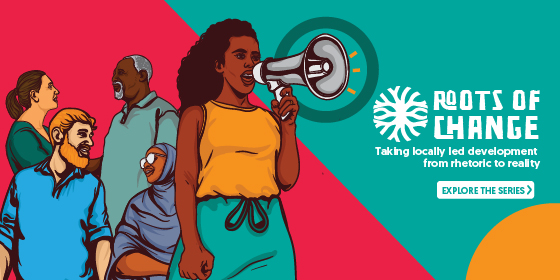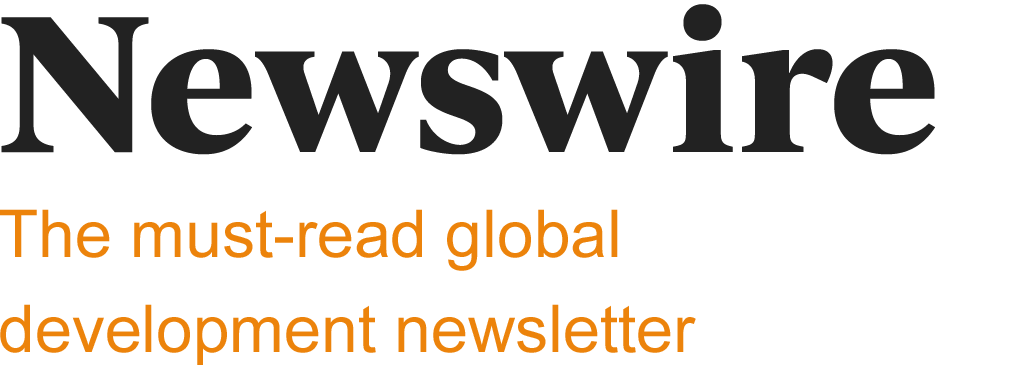|
The World Bank’s new scorecard, and what PEPFAR cuts could mean for Botswana.
|
|
|
|
The hits keep on coming for PEPFAR — and not in a good way. Also in today’s edition: Republicans in the U.S. Congress get out the budget scissors, and the World Bank slims down. 
|
|
PEPFAR in the crosshairs, again
First, the landmark initiative known as the U.S. President’s Emergency Plan for AIDS Relief failed to secure the five-year reauthorization that development advocates had hoped for. Instead it got a one-year reauthorization, signaling potentially waning interest in the U.S. Congress for a program credited with saving 25 million lives over the last 20 years.
Now, its future is further clouded by funding cuts. Politico revealed that the Biden administration intends to chop PEPFAR funding by more than 6% in fiscal 2025. The State Department confirmed the cuts. “The department has gradually spent down a glut in the PEPFAR budget from years in which funding from Congress exceeded State’s ability to spend it,” wrote Politico's Carmen Paun. “Now the glut is gone and Congress in March held the program’s $4.4 billion budget flat.” It’s another blow for PEPFAR, especially after the program became caught up in America’s culture wars — with Republicans accusing it of funding abortions, even though U.S. law prohibits this. The one-year reprieve that eventually passed got mixed reviews, with some applauding the compromise and others warning it sets a dangerous precedent of politicizing the program. Now, supporters are bracing for more turmoil. “PEPFAR continues to be the greatest driver of public health impact — not just in the AIDS response but across global health,” Mitchell Warren, executive director of the HIV prevention nonprofit AVAC, wrote to Devex. “Sadly, the current political and economic realities in the US and globally jeopardize more than two decades of progress. These fiscal pressures are not new; the US's global HIV budget, including PEPFAR, has been flat funded for over a decade — which amounts to a decline in annual spending power — and that's not how we achieve 2030 targets,” Mitchell said. “The progress to date, which is remarkable overall, has been uneven across countries and across populations, and now it is critical that advocates, policy makers and national governments work with PEPFAR (and the Global Fund) to get specific and strategic about how to ensure past gains are not lost and that the ambitious targets can actually be met,” he added. “It is up to Congress in FY25 appropriations to robustly resource PEPFAR to help the world meet our community’s 2030 targets.” |
|
special notice
 Do we have what it takes to act on the rhetoric of locally led development? In Roots of Change, Devex gathered insights and reflections from experts to shed light on the localization agenda. Follow the series to get the latest expert insights on localization. |
|
Potential fallout
In Botswana, one NGO isn’t surprised by the cuts. Now an upper-middle-income country, Botswana is already anticipating a transition out of PEPFAR support in the coming years.
But that’s not to say they aren’t concerned. A cut in funding could be particularly consequential for community-based programs that support key populations. In Botswana, these programs are dependent on PEPFAR and Global Fund support, Cindy Kelemi, executive director of health and human rights NGO BONELA, tells Devex. It could also affect gains made by the country on addressing HIV and AIDS. Botswana is one of the few countries that has made significant progress on HIV and AIDS. It has achieved the UNAIDS 95-95-95 targets, which translates to 95% of people with HIV knowing their status, 95% of people who know their status are on lifesaving antiretroviral treatment, and 95% of those receiving treatment achieve viral suppression. However, the country still has over 2,000 new infections annually, Kelemi says. The NGO itself is also concerned about the impact of a PEPFAR funding cut on their ability to continue providing legal services to protect the rights of people affected by HIV, especially if they lose funding from the Global Fund and PEPFAR. “Botswana is an upper-middle-income country, and we don't have many donors that are at our disposal to say they can continue where PEPFAR has left off,” Kelemi says. Read: What a PEPFAR funding cut could mean for the HIV response in Botswana |
|
Death by a thousand cuts?
It’s important to note that U.S. spending across the development spectrum will be slashed if Republicans in the House of Representatives get their way.
As we reported earlier, the House passed a foreign affairs funding bill for 2025 that would gut billions of dollars from USAID and the State Department (where PEPFAR now resides). The bright spot for development advocates: The bill is unlikely to pass the Senate — but it does outline what the Republican-led House will be pushing for in the months to come. “I think it’s very unlikely that much of anything from this bill would get passed wholesale,” Katy Crosby of Mercy Corps tells my colleague Elissa Miolene. “But the significance is one: messaging, and two: staking out a bargaining position. If this is how low the House is starting, depending on what the Senate comes out with, you usually meet somewhere in the middle." The baseline proposed by the House would allocate $51.7 billion for US diplomatic and development programs for the next fiscal year. That’s a $6.6 billion drop — an 11% decrease — from 2024, and a figure 20% below the Biden administration’s request. Security assistance would go up while nearly everything else would plummet. Humanitarian assistance alone would be slated for a 32% reduction from the 2024 fiscal year, according to an analysis by the U.S. Global Leadership Coalition. Operating expenses for USAID and many U.N. agencies are also on the chopping block. The legislation also proposes the elimination of more than 18 “unnecessary programs.” “We are cutting wasteful spending while fulfilling our national security commitments,” Rep. Mario Díaz-Balart, the Republican chairman of the State and Foreign Operations Subcommittee, said in a statement. “This bill will advance global freedom, manifest strong solidarity with our allies, and stand firm against the malign forces undermining U.S. national security.” ICYMI: ‘Damaging’ US foreign affairs budget cuts funding, fuels partisan politics |
|
Ctrl Shift Equality: Produced in Partnership
Rise in femicide in Kenya puts technology’s role in the spotlight
The latest spate of gender-based violence has brought attention to the part technology played in the killings. Devex hears about why it's happening and what needs to be done to address the root of the problem. |
|
Keeping score
The World Bank is also instituting cuts — but in a good way. It’s cutting down on bureaucratic red tape by taking what was once 150 indicators that measured progress on everything from education to food security and narrowing it down to just 22 indicators.
And the anti-poverty lender just released the first 11 indicators as part of a new corporate scorecard spearheaded by bank President Ajay Banga to streamline operations. “If you prioritize everything, you prioritize nothing, so we’re trying to zero in on the key results that matter,” Ed Mountfield, World Bank vice president for operations policy and country services, tells my colleague Adva Saldinger. “A key goal here is also accountability and we're working towards radical transparency. This is a level of transparency that we've never really had before in terms of our results.” So what are some of those results? By the midway point of the 2024 fiscal year, the bank had helped 287 million people access social safety net programs, nearly matching its expected impact of 288 million. But on education, it fell short, with some 280 million students receiving better education, 63 million off target. Furthermore, some 100 million people gained access to electricity, considerably below the 326 million goal. Exclusive: World Bank releases first set of scorecard indicators |
|
sponsored announcement
Shape your career in sustainable finance with Frankfurt School
Explore a diverse portfolio of cutting-edge topics, from biodiversity finance to sustainable agricultural finance. Our online flexible, self-paced programs allow you to study anytime, anywhere, and earn certification in just six months. For those aiming for higher education, consider our diploma in financial inclusion or green finance, or even our master of leadership in sustainable finance. Discover our offerings and advance your career in sustainable finance today. |
|
In other news
South Africa is seeking to renegotiate a $2.6 billion landmark climate finance deal so it can keep three coal plants open despite earlier commitments to phase them out. [Bloomberg] U.N. agencies highlighted the dire humanitarian crisis in the eastern Democratic Republic of Congo, with 2.8 million people displaced in North Kivu, while the $2.6 billion response plan is only 26% funded. [UN News] The World Meteorological Organization warned that Hurricane Beryl may herald an exceptionally dangerous hurricane season in the Atlantic with the potential to devastate decades of development. [VOA] 
|
|
Thank you for reading today’s Newswire, edited by Rumbi Chakamba, copy edited by Nicole Tablizo, and produced by Patricia Esguerra. Have a news tip? Email [email protected].
Forwarded by a friend?
Sign up here to receive the Newswire directly.
|
|
Devex thanks our partners for supporting our newsletters.
Our editorial content remains independent. Interested in partnering with us? Get in touch. |
|
Connect with us:
|






